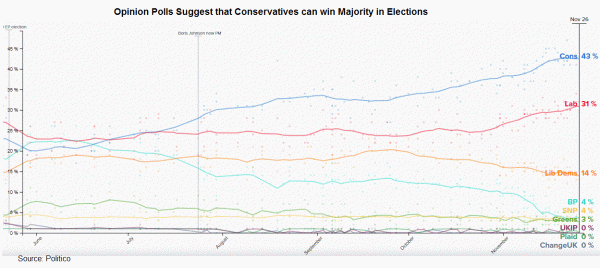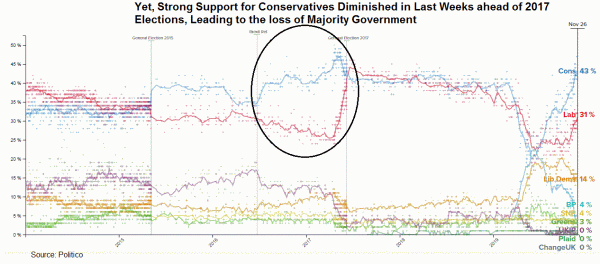With UK elections approaching in two weeks’ time (December 12), opinion polls suggest that both Conservatives and Labors have consolidated support. Poll of polls indicates that support for Tories have risen to 43% as of November 26. This marks an increase of 4 percentage points from 3 weeks ago. Meanwhile, support for Labors also climbed higher to 31%. As such, Tories’ lead over Labors steadies at about 10%. Gains in support for the two major parties came in at the expense of smaller ones such as Lib Dem and Brexit Party. In particular, support for the latter declined from about 10% earlier in the month the current 4%.
UK elections adopt a “First-past-the-post” system, under which a candidate would win a seat as long as he/she gains more votes than any of his/her rivals in that constituency. Under this “winner takes all’ system, political parties can win seats with a minority of the vote share in a given constituency. Projections show that Conservative Party could get over half of the 650 seats in the parliament if the current 42% support is translated into votes.

 A Tory majority would likely minimize Brexit uncertainty as PM Boris Johnson’s withdrawal bill could easily get approved in the parliament. However, the chance of a hard Brexit is increased with Johnson’s determination to seek a Canada-style trade agreement with the EU after Brexit. In the case, UK will not stay in the single market or customs union after leaving the EU. Meanwhile, a hard Brexit will not be accepted by Scotland, intensifying demand for independence. Similarly, this will also trigger discontent from Northern Ireland.
A Tory majority would likely minimize Brexit uncertainty as PM Boris Johnson’s withdrawal bill could easily get approved in the parliament. However, the chance of a hard Brexit is increased with Johnson’s determination to seek a Canada-style trade agreement with the EU after Brexit. In the case, UK will not stay in the single market or customs union after leaving the EU. Meanwhile, a hard Brexit will not be accepted by Scotland, intensifying demand for independence. Similarly, this will also trigger discontent from Northern Ireland.
However, projecting seats from polls can be risky and unreliable. Back in 2017, an even bigger lead triggered the then-PM Theresa May to snap elections. However, the lead narrowed to only 2 percentage points as the election day came closer. Tories lost the majority government as a result of the elections. Therefore, another likely outcome for the upcoming elections is a hung parliament. Under this scenario, Conservatives will have to rely upon the DUP for passage of the withdrawal agreement. Since DUP has already rejected the deal, the risk of no deal Brexit would increase again.
